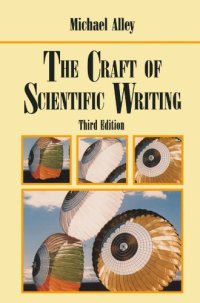
Ebook: The Craft of Scientific Writing, 3rd ed.
Author: Michael Alley
- Genre: Mathematics // Computational Mathematics
- Year: 1996
- Publisher: Springer
- City: Berlin; New York
- Edition: 3rd
- Language: English
- pdf
This work brings together two streams in computer algebra: symbolic integration and summation on the one hand, and fast algorithmics on the other hand. In many algorithmically oriented areas of computer science, theanalysisof- gorithms–placedintothe limelightbyDonKnuth’stalkat the 1970ICM –provides a crystal-clear criterion for success. The researcher who designs an algorithmthat is faster (asymptotically, in the worst case) than any previous method receives instant grati?cation: her result will be recognized as valuable. Alas, the downside is that such results come along quite infrequently, despite our best efforts. An alternative evaluation method is to run a new algorithm on examples; this has its obvious problems, but is sometimes the best we can do. George Collins, one of the fathers of computer algebra and a great experimenter,wrote in 1969: “I think this demonstrates again that a simple analysis is often more revealing than a ream of empirical data (although both are important). ” Within computer algebra, some areas have traditionally followed the former methodology, notably some parts of polynomial algebra and linear algebra. Other areas, such as polynomial system solving, have not yet been amenable to this - proach. The usual “input size” parameters of computer science seem inadequate, and although some natural “geometric” parameters have been identi?ed (solution dimension, regularity), not all (potential) major progress can be expressed in this framework. Symbolic integration and summation have been in a similar state.